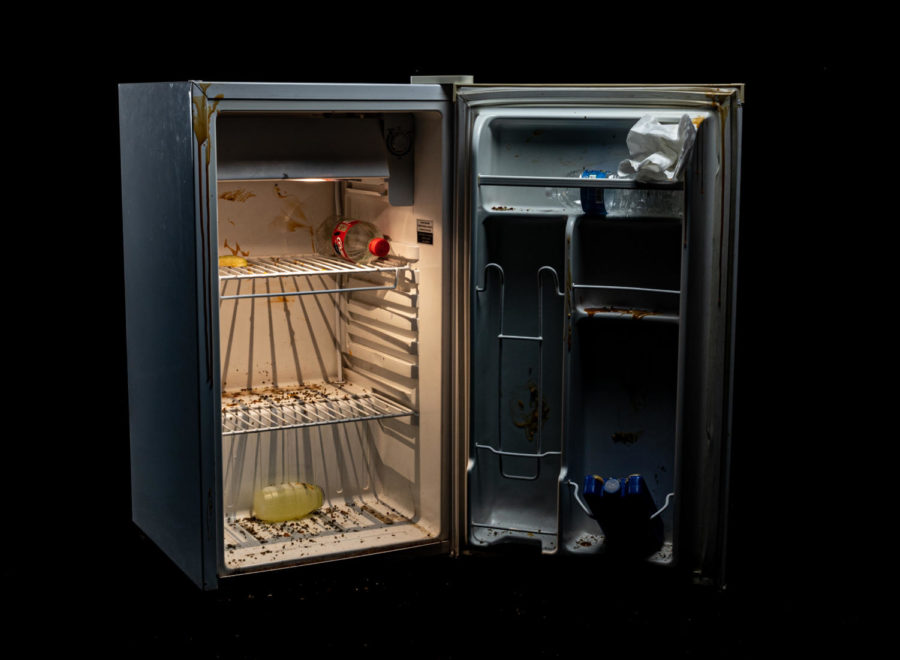Behind closed cabinets
Confronting the crisis of food Insecurity in our community
Photo by Kristina Colburn
According to the U.S. Department of Agriculture, 10.4 percent of American households experienced hunger in 2021, Texas being one of the states with the highest percentage.
January 31, 2023
The flickering fluorescent bulb casts a forlorn glow as the door creaks open, illuminating the desolate, bleached-white room. Once a bustling canvas of vivid red apples and lush greens, the space now lies barren and abandoned. This haunting reminder is sadly not a vacant room for 34 million people across the United States, but the view of empty shelves in their kitchen refrigerators day after day.
Food insecurity creeps into every corner of the world, from the bright lights of bustling metropolises to the quiet, rural towns of just a few hundred residents. No community is immune, not even the homes of the hardest-working families. Tragically, the city of Texarkana is no exception, falling prey to this merciless affliction that refuses to discriminate based on race or status.
“We had a grandmother who hugged her boxes of cereal and said she did not know how I was gonna feed my grandkids over the break,” said Susan Waldrep, leadership teacher, and student council advisor. “And I was like, man down, man down, I’ve got a woman hugging cereal; you know, we just don’t think about those things.”
The shadow of food insecurity darkens the lives of countless individuals, among them nine million innocent children—the same children playing at your local park or attending the nearby elementary school. They did not choose this fate, but they face the bleak reality of a weekend filled with uncertainty and fear, wondering where their next meal will come from. The thought of these bright young lives burdened by such worries is a heart-wrenching injustice.
“I’m always amazed at just what a box of snacks can do,” Waldrep said. “When we did Tiger Angels this year at Highland Park, three of the families were homeless; one of the little kids that we brought gifts had had their electricity turned off that morning.”
The cruel myth of employment equating to security still persists, even as countless workers face the daily reality of food insecurity. For many, the specter of an empty table looms large, casting a shadow over their hard-won wages and their daily grind. It’s a tragedy that those who work tirelessly are still plagued by the fear of hunger, forced to live with the injustice of uncertainty in the very basic necessity of life.
“We had a family that was working, but they still couldn’t make ends meet. [The wife] was disabled, had seizures, as well as epilepsy, and wasn’t able to take medicine,” said Sharon Ward, missions committee member for Williams Memorial Methodist Church. “So we were able to get her in contact with some people that could help her, and so, through community cafe and some of the outreach that we’ve done, we kind of got them into a place where they could afford the rent.”
The grim reality of food insecurity takes a toll on communities and individuals alike, leaving many in dire straits. Many of those who trench through these issues are a part of the already struggling unemployed population as well.
“There was a family that both parents had lost their jobs, therefore everything went down at once so they did not have food and they were functioning paycheck to paycheck until that point,” Waldrep said. “We took different things and dropped them off on the porch, and the mom came out. She was just so appreciative, but my kids said there weren’t any furniture in the house. So, because we knew, we not only provided food, we provided pillows, blankets and a couch, and she was just overwhelmed.”
The broken landscape of food insecurity stretches across the stateline, touching both Texas and Arkansas in its wake. These two states, now rank among the highest in the nation for this pervasive affliction. The toll it takes is felt by all, from the families struggling to put food on the table to the communities left scarred by its devastating effects. It’s a somber reminder of the fragility of security, even in the heart of America.
“If you look at the statistics, our area has some of the highest food insecurity across the nation,” Ward said. “I honestly think that people just don’t think about it; you know, everybody goes through their own day, and you don’t really notice if that’s not a problem for you.”
Despite the overwhelming scope of food insecurity, the human spirit refuses to be daunted. Across our community, individuals with kind hearts and unwavering resolve rise to the challenge, determined to make a difference in the face of this growing crisis. They shine like beacons of hope in the darkness, reminding us that even the largest problems can be tackled with compassion and determination, one act of kindness at a time.
“The food pantry has always kind of been the same since I’ve been helping with it,” Ward said. “You can come in and get two bags of groceries per household. We wanted to get to know these people better and the best way to do that is over a meal.”
The students of our community have taken up the mantle of hope, their youthful energy and empathy a shining example to us all. They’ve lent a hand in countless ways, from volunteering in their communities to starting programs within the walls of their own schools. They are a testament to the boundless potential for kindness and the boundless capacity for change that lies within each and every one of us. These students inspire us with their pure-hearted compassion, reminding us that a brighter tomorrow is always within reach.
“We team with Community Cafe to go in and sack groceries; it’s very organized, the clients who come in have to have proof of a residence but if they don’t, then we get them lined up with Randy Sams,” Waldrep said. “The Tiger pantry is a really cool thing that we do; we get calls a lot for kids here at the high school, and we’ll either deliver the necessity whether it be a box of food, or a coat for welding, so the tiger pantry provides more than just food. It’s more so our basic needs, from school supplies to clothing and food.”
The community also helps through fundraising. Texarkana independent school district has a vested interest in the well-being of its students; therefore, it is not one to shy away from causes such as this.
“Mu Alpha Theta and other clubs do a food drive every year for the tiger pantry,” Waldrep said. “We also have funding through the TISD foundation to buy food and clothing which helps tremendously.”
Not only do these programs help alleviate the “blank canvases” left in the refrigerator, but they help build connections between individuals that last a lifetime.
“One of the best things I see through the tiger pantry is that we take care of each other through community,” Waldrep said. “You’re building those relationships and in that process, you’re breaking down barriers between what they perceive as the haves and the have-nots. And we are all a part of a community that just needs to help each other.”
Texas High’s Leadership program has also been of great use when it comes to aiding in the effort of volunteering. During their assigned period, many will venture to Community Cafe in order to help speed up the sacking process.
“I have to tell you how much I appreciate the help from the kids at Texas High,” Ward said. “They do all the things that I asked them to do and that takes me a long time even if I get two or three volunteers. I don’t really know if they realize how important they are to us and how much we appreciate them and the things that they do.”
As we delve deeper into the issue of food insecurity, one thing becomes clear: this is not just a problem for those who suffer from it, but a challenge for all of us to tackle together. The lesson we should take from this is that food insecurity is a complex and widespread issue, but one that can be addressed through collaboration, generosity and a commitment to ensuring that no one goes hungry.
“Watch what you waste, because you may not think anything about it, but to someone else, it may be a lifeline,” said Waldrep. ”I just cannot imagine how fabulous it would be if we each just changed a little bit, created a whole new community.”
















